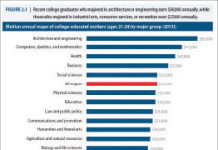When asked about the direct and immediate impact of the devaluation of the naira, the Managing Director and Chief Executive Officer, Financial Derivatives Company (FDC), Bismarck Rewane, explained that to governments at all levels, there will be “money illusion”.
This means that in terms of volume, there will be increase in government revenue when what comes in will be multiplied by N198 instead of N168 to the dollar. In nominal terms, states will have more money to pay workers but in real terms, the value of the money has reduced.
Damilola Akinbami, a research analyst at FDC, also noted that there may be agitation for increase in minimum wage because workers’ salaries will buy less.
“The value of naira is down and people will pay more to get less, especially of imported items,” she stressed.
She added that the cost of imported raw materials have gone up because a fall in the exchange rate makes imported goods and services more expensive, pointing out that producers may then pass on higher costs to consumers.
This causes extra “cost-push” inflation. Therefore, the options open to manufacturers will be to bear all the cost and make loss or transfer some of the cost to consumers and remain at break-even point or transfer all the cost to consumers.
Never has an average Nigerian workers’ earnings been more valueless than since after the Central Bank of Nigeria (CBN) took naira devaluation as part of measures to stop speculative attacks on the currency by foreign exchange (forex) dealers in order to save fast eroding external reserves.
Economic experts are unanimous that a depreciation of the naira sees its market value fall against other currencies and that its economic effects take time to happen because there are time lags between a change in the exchange rate and changes in, for example, inflation and the balance of payments.
The naira was devalued by 8.4 per cent in November 2014, and by the end of February 2015 it was tactically devalued again by about 3 per cent against the dollar.
Further devaluation is possible and may continue in that direction for some time.
Analysts cite the devaluation of British pound in September 1992 which was devalued by nearly 15 per cent against a range of currencies, and thereafter the currency continued to drift lower in value for the next three years.
While this situation lasts, the worker will continue to be at the receiving end since he will have to pay more for the same or lesser volume of goods and services on which he used to spend his earnings prior to devaluation.
The question remains: When will the crisis-ridden Nigeria Labour Congress (NLC) and Trade Union Congress (TUC) begin agitation for wage increase across all categories of Nigerian workforce?
Until workers’ earnings improve, many will continue to toil long and hard but may not afford a fairly decent livelihood that will make the hours of work happier and thus make the hard graft worthwhile.
There is a direct correlation between people’s level of happiness and income. There is always a rise in life satisfaction levels in line with earnings. The more people toil without commensurate pay, the higher the tendency for them to seek other ways of meeting up with financial responsibilities.
As workers get financially more secure and can afford better work life balance, the better for their employers and the society. Work life experience has shown that what cheating employers hold back from employees, they lose in many ways without knowing it.
This is because an unhappy workforce has ways of getting even with employers, private or government. The more people earn the better they are able to manage the impact and effects of the devalued naira.












